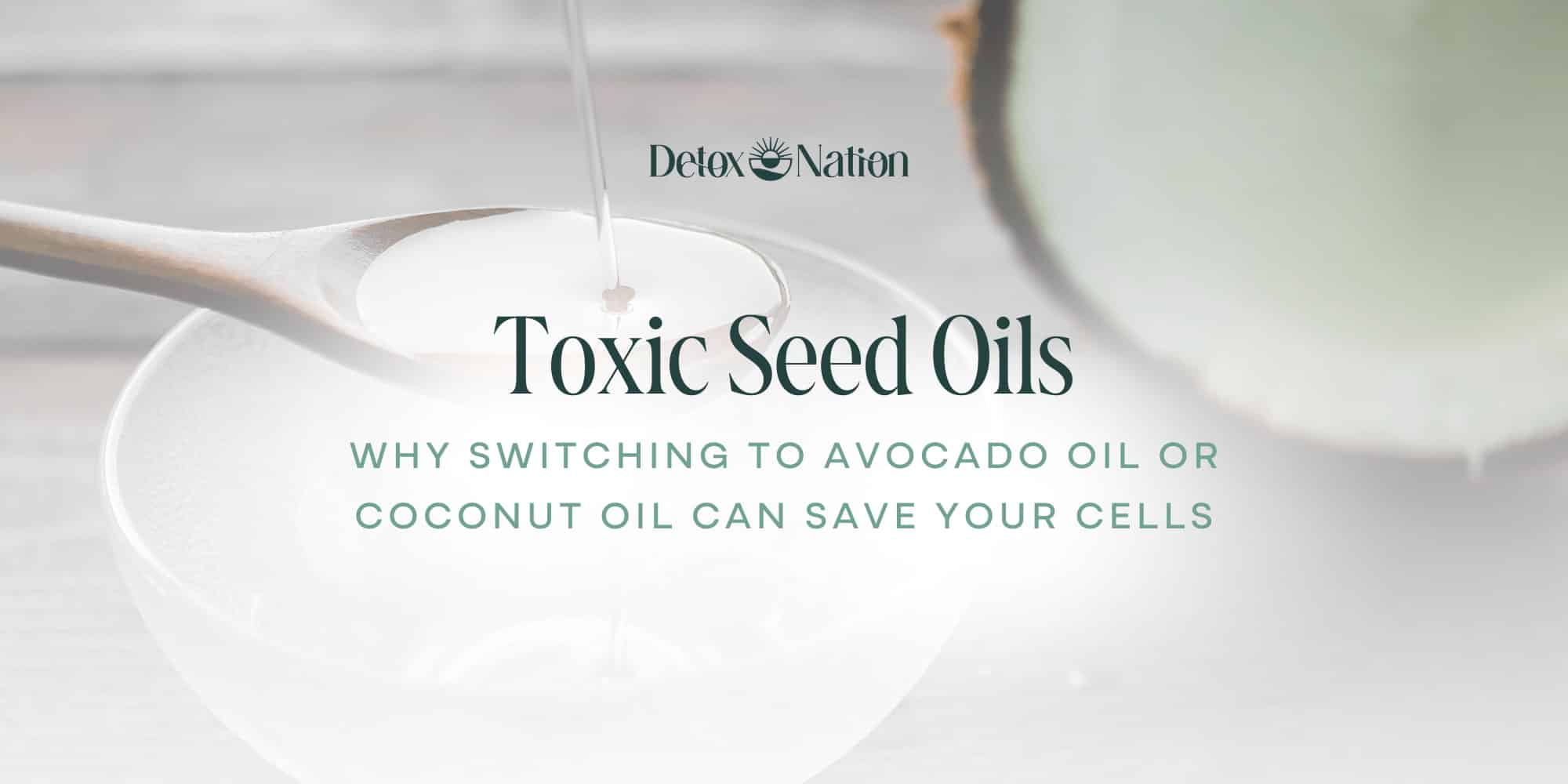Your so-called “healthy” cooking oil might be the reason you’re inflamed and exhausted. Seed oils cause chaos at the cellular level, but good fats like coconut oil and avocado oil have significant health benefits!
Imagine this: you’re standing in the grocery store, scanning the shelves, trying to make a “heart-healthy” choice.
You reach for that bottle of canola oil because, hey, it says cholesterol-free, light, and recommended by experts.
Meanwhile, butter, lard, and coconut oil sit in the villain section, demonized by decades of propaganda.
But here’s the truth, the food industry doesn’t want you to know: the oils marketed as “healthy” are some of the most toxic substances in your kitchen.
Industrial seed oils—canola, soybean, corn, and their shady cousins—aren’t real food.
They’re cheap, highly processed byproducts that were never meant for human consumption in the first place.
They’re hiding in plain sight—inside your salad dressing, your “healthy” granola bar, and even that organic hummus.
Industrial seed oils are silently wrecking your metabolism, gut, and brain function—while being sold to you as a health food.

The worst part? Once these toxic fats get into your system, they don’t just pass through.
They embed themselves into your cells, altering your biology from the inside out. (But don’t worry—this isn’t another doom-and-gloom exposé.)
So, how did we get here?
How did we go from thriving on nourishing fats to guzzling inflammatory, oxidized seed oils at every meal?
And most importantly, what is this doing to your health?
Buckle up, because we’re about to take a close look at one of the biggest food scams of the century.
Toxic Vegetable Oils: The Biggest Food Scam You Never Noticed
Fats have been villainized in today’s world, but they are necessary for optimal health. Did you know the fats in your body protect your organs, help your nerves transmit their signals, and help form your hormones?
In addition, fats form the cell membrane of every cell in your body.
Once integrated into your cell membranes, toxic PUFAs like linoleic acid can stay in your membranes for a staggering 5-7 years (1, 11, 12).
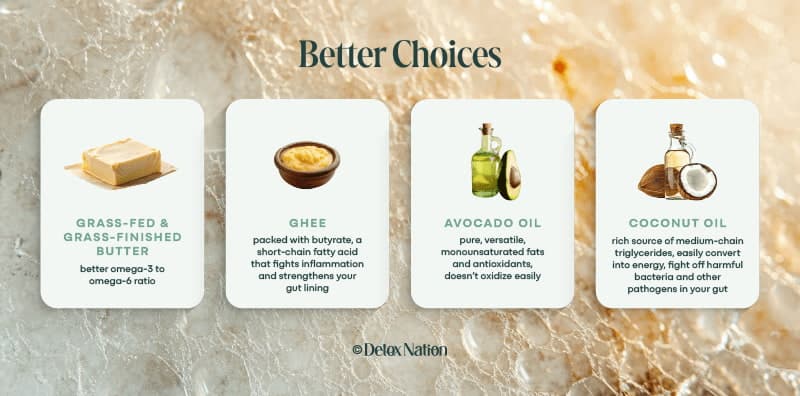
A healthy cell membrane is essential for the proper functioning of the cell. (I think the cell membrane is even more important to the cell than the nucleus!)
If you’ve been cooking with canola oil or sunflower oil, I’ve got bad news.
And if you’ve been told they’re “heart-healthy,” I’ve got even worse news.
Industrial seed oils—also called vegetable oils—are one of the most damaging ingredients in modern diets, yet they’re everywhere.
Restaurants, packaged foods, so-called health snacks, and even your favorite organic salad dressing are all loaded with them.
For decades, we’ve been told these oils are the healthier choice, replacing traditional fats like butter, lard, and coconut oil.
But here’s the real story: Industrial seed oils are inflammatory, oxidize easily, and play a major role in everything from gut damage to chronic disease.
The worst part? They’re marketed as “essential” to your health.
Let’s break this scam wide open.
What Are Industrial Seed Oils? (AKA Cooking Oils)
Industrial seed oils include canola, soybean, corn, cottonseed, sunflower, safflower, grapeseed, and rice bran oil. They don’t come from anything you’d naturally want to eat, which is why they require intense processing to become edible.
The production process looks more like a chemistry experiment than food prep.
Ready to take back your health?
Unlock the tools, guidance, and support to reduce inflammation, restore balance, and finally feel good in your body again.
Join Rapid Gut Reset NowFirst, the seeds are heated to extreme temperatures, which oxidizes the already unstable fats (2, 3).
Then, they’re blasted with chemical solvents (hello, hexane) to extract every drop of oil (2, 3).
The result is a rancid, foamy substance that smells terrible, so it’s deodorized with even more chemicals (2, 3).
During high-heat processing, additives such as dimethylpolysiloxane may be included to prevent foaming.
I mean, I can’t even pronounce that word. Why would I want to snack on it?
Finally, the oil is bleached to remove its grayish color and slapped into bottles labeled “heart-healthy.”
While this process yields large amounts of oil, it strips natural nutrients like essential vitamins A, D, and K (2). (Great for the manufacturer, but not so great for you and your health!)
It’s been estimated that Americans ate about 2 grams a day of vegetable oils in the early 1900’s.
By 2010, that number had increased to an astounding 80 grams of vegetable oils per day (1). That accounts for over 700 calories!
So, if you eat the Standard American Diet, about 1/3 of your daily calories are factory-produced. Gross.
These oils are now the backbone of processed foods, thanks to their long shelf life and cheap cost.
They’ve quietly replaced the nourishing fats our ancestors relied on, and we’re paying the price in skyrocketing rates of inflammation, obesity, and metabolic dysfunction.
What About Extra Virgin Olive Oil?
While authentic EVOO can be packed with health benefits, unfortunately, most EVOO can’t be trusted.
These oils are often blended with toxic seed oils to reduce cost, and they may still undergo oil extraction processes that can result in toxic residues (6, 7).
Many companies use deceptive marketing tactics to make their counterfeit oil seem authentic (7).
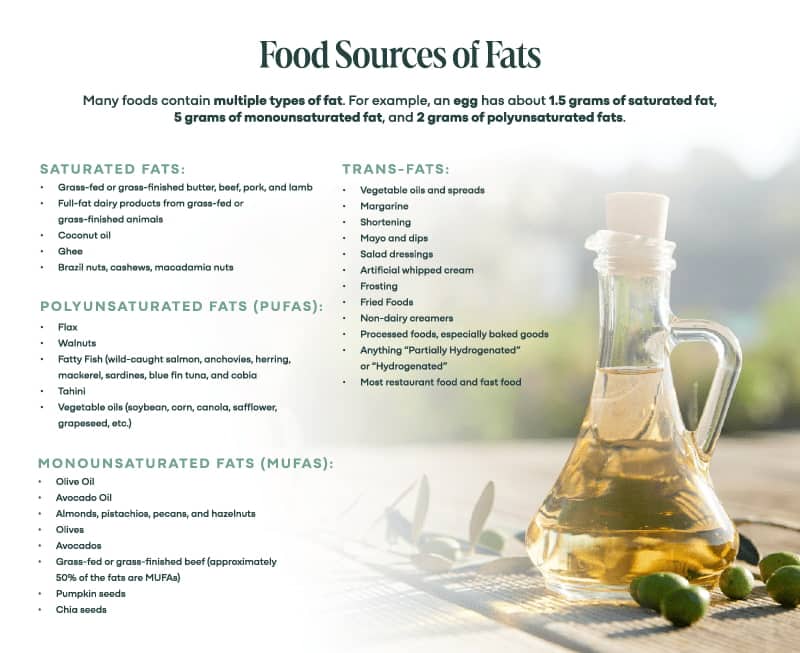
Furthermore, it has a lower smoke point than avocado oil, which means cooking at high temperatures isn’t as safe (10).
As with many things, it all depends on the quality of the oil in question, sourcing, and the specific brand (7). But in general, there are better options.
How Seed Oils Destroy Your Health
Industrial seed oils have serious detrimental effects on your health. These oils may become cytotoxic (poisonous to your cells), genotoxic (poisonous to your genes), or mutagenic (cause genetic mutations).
Processed seed oils can (1):
- Promote inflammation and free radical damage
- Cause mitochondrial dysfunction
- Damage the cells that line your blood vessels
- Impair your immune system
- Decrease glutathione and other antioxidants
- Cause insulin resistance
- Cause memory impairment and increase your risk of neurodegenerative diseases
Omega-6 Overload, Chronic Inflammation, & Heart Disease
Omega-6 fatty acids aren’t inherently evil—your body needs them in small amounts.
But here’s the problem: the modern diet has completely thrown our omega-6 to omega-3 ratio out of whack (5).
Our ancestors maintained a 1:1 balance, while today, the average person is consuming a staggering 20:1 ratio.

This imbalance fuels chronic inflammation, the root cause of almost every modern disease—think heart disease, obesity, autoimmune disorders, and even depression.
Chronic inflammation isn’t something you “feel” right away.
It builds up over time, silently damaging cells and tissues, setting the stage for insulin resistance, gut issues, and brain fog.
Oxidized Fats & Free Radicals
Polyunsaturated fats (PUFAs), which make up the bulk of industrial seed oils, are highly unstable.
That means they oxidize easily, creating harmful free radicals that damage your cells.
When you cook with these oils—or worse, when food manufacturers fry snacks in them—these fats become even more toxic.
The oxidation process creates aldehydes, which wreak havoc on everything from your DNA to your brain cells.
And if you think switching to “cold-pressed” versions of these oils is the solution, think again—once inside your body, they oxidize just as quickly.
Seed Oils & Your Gut
Your gut is home to trillions of microbes that influence everything from digestion to immune function. Seed oils disrupt this delicate ecosystem by increasing gut permeability, aka leaky gut.
Leaky gut is exactly what it sounds like—tiny gaps form between your intestinal cells, allowing toxins and undigested food particles to leak into your bloodstream. This triggers immune responses, food sensitivities, and systemic inflammation.
In other words, the same oil being sold as “heart-healthy” is quietly destroying your gut lining, making you more susceptible to bloating, food sensitivities, and autoimmune disorders.
And did I mention that peanut oil can be contaminated with mycotoxins, further damaging your gut (8, 9)?

The Seed Oil Scam—Why Are They Pushed as Healthy?
If industrial seed oils are so toxic, why are they still being promoted?
Simple: money.
Back in the early 1900s, companies like Procter & Gamble saw an opportunity to turn cheap industrial byproducts (like cottonseed oil) into food products.
Crisco was one of the first, marketed as a “cleaner” alternative to animal fats.
Fast forward to the 1950s, and the American Heart Association—funded by seed oil manufacturers—jumped on the bandwagon, pushing the narrative that saturated fats were dangerous, and seed oils were the cure.
Studies were cherry-picked to show that seed oils lowered cholesterol, while conveniently ignoring their role in oxidative stress and inflammation.
The result?
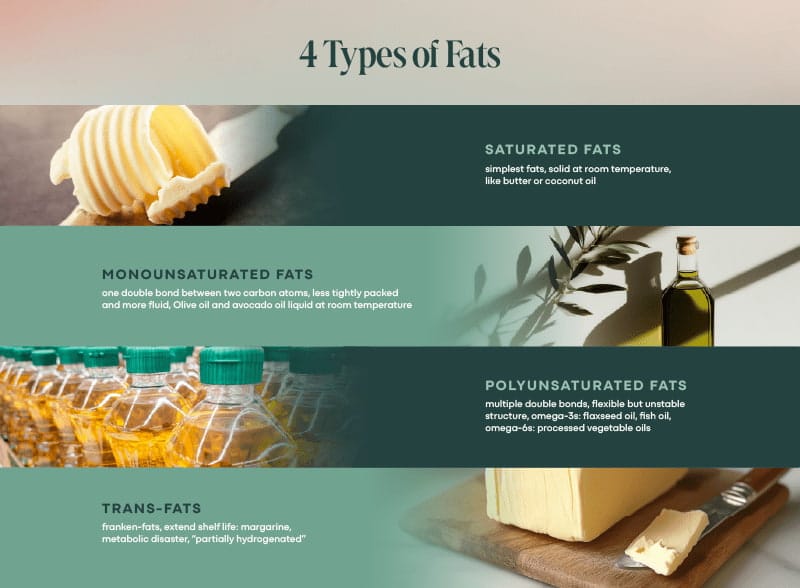
Butter, lard, and coconut oil were demonized, while chemically processed oils became the gold standard.
Today, we’re dealing with the fallout—higher rates of chronic disease, metabolic dysfunction, and a population that’s more inflamed than ever.
Buyer beware!
In an ever-increasing push towards profit, manufacturers are even looking to replace vegetable oils in foods with oils made from insects like mealworms (21) – disgusting!
But not all fats are toxic. Switching out toxic fats for nourishing fats is easy – better health never tasted so good!
What Different Oils Should I Use Instead? Enter: Real, Non-Toxic Oils
The good news? You don’t have to play along with this scam. Here’s what to use instead:
Grass-Fed Beef Tallow & Ghee
Before the seed oil industry convinced everyone to slather their food in inflammatory, unstable oils, humans thrived on cooking fats like grass-fed beef tallow and ghee.
These traditional fats aren’t just stable at high temperatures—they’re loaded with fat-soluble vitamins (A, D, E, and K) that support your health rather than wreck it (4).
Your great-grandparents knew what was up: these were the go-to fats for frying, roasting, and even skincare (yep, people used to moisturize with tallow before petroleum-based junk took over).
Then came the seed oil propaganda machine, demonizing saturated fats and pushing cheap, industrial oils as a “heart-healthy” alternative.
Meanwhile, tallow and ghee remain the same deeply nourishing, heat-stable, and delicious fats they’ve always been (4).
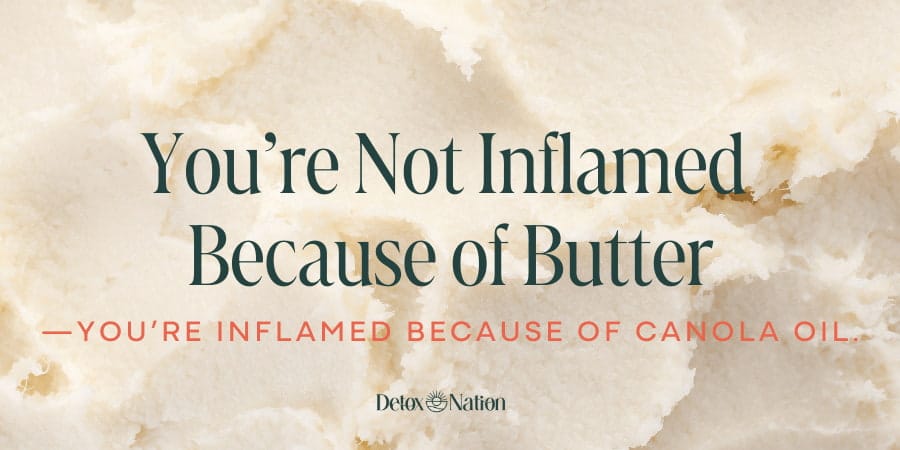
So, if you’re still cooking with seed oils, it’s time to take a page from history and bring these real fats back into your kitchen.
Coconut Oil: Your Metabolism’s Best Friend
Coconut oil has been unfairly dragged through the mud for years, all thanks to a well-funded smear campaign by—you guessed it—the seed oil industry.
The very same companies pushing highly processed, inflammatory oils like canola, soybean, and corn oil needed a villain to keep their profits high.
And since coconut oil is rich in saturated fats (the kind that don’t oxidize and turn rancid when heated), they set out to convince the public that it was practically poison.
The reality?
Coconut oil is packed with stable saturated fats that don’t break down into toxic byproducts when exposed to heat—unlike the fragile polyunsaturated fats in seed oils (15, 16, 17, 18).
Even better, its antimicrobial properties come from its high lauric acid content, which can help keep gut pathogens in check (15, 16, 17).
And if you’re worried about weight gain, here’s a fun fact: the medium-chain triglycerides (MCTs) in coconut oil are metabolized differently than other fats, meaning they provide quick energy and can even support weight loss (15, 16, 17).
It’s even been shown to reduce oxidative stress and help with Alzheimer’s and Dementia (18, 20).
The next time someone tries to tell you coconut oil is bad for you, just remember who paid for that narrative—and who benefits from you sticking to the cheap, inflammatory oils instead.
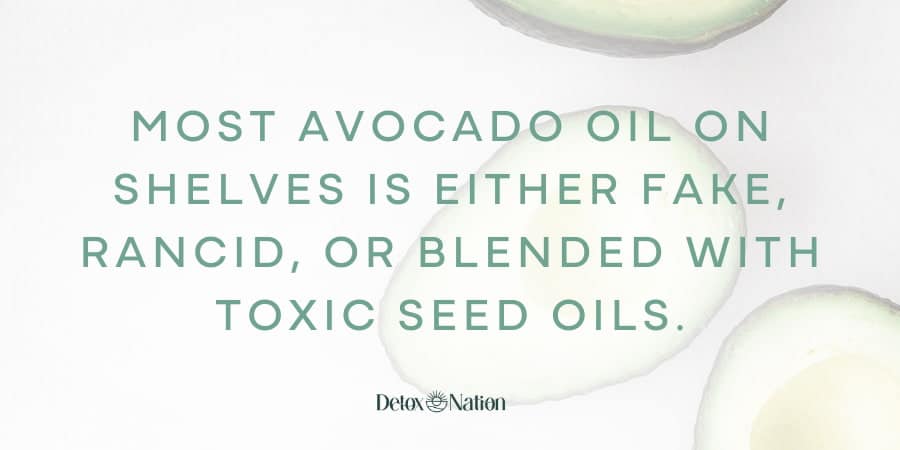
Benefits of Avocado Oil
Avocado oil sounds like a dream come true, right?
High in monounsaturated fats, stable at high temperatures, and loaded with nutrients—what’s not to love (13, 14, 19)?
Well, if you’re getting the real stuff, it’s fantastic.
But here’s the dirty little secret no one tells you: most of the avocado oil on store shelves is either rancid, cut with cheap seed oils, or both.
Yep, a shocking percentage of avocado oil is already oxidized before you even open the bottle.
And even worse?
Many brands sneak in low-quality soybean or canola oil to stretch their profits while slapping a premium price tag on the label.
So how do you avoid getting scammed?
Simple: if it’s cheap, it’s fake.
Real avocado oil costs more because it takes actual effort to produce.
Look for brands that are cold-pressed, stored in dark glass bottles, and sourced from reputable producers.
Anything else? Might as well drizzle straight-up seed oil on your food and call it a day.
Take Control of Your Health
Read Every Label
Reading food labels isn’t just a good habit—it’s a survival skill in today’s processed food landscape.
If you want to avoid toxic seed oils, you must dig deeper than just the front of the package, where misleading buzzwords like natural, heart-healthy, and organic can trick you into a false sense of security.
Flip that package over and scan the ingredients list—not just the nutrition panel.
Look out for canola, soybean, corn, cottonseed, sunflower, safflower, rice bran, and grapeseed oils, as these are cheap, inflammatory, and oxidize easily.
And here’s a sneaky trick: manufacturers often rename oils to disguise them.
For example, seed oils could be hidden under “vegetable oil blend.”
The general rule? If you can’t pronounce an ingredient, it probably doesn’t belong in your body.
The shorter and simpler the ingredient list, the better.
Cook at Home
Cooking at home is one of the best ways to take control of your health—because even the fanciest restaurants are drowning their dishes in seed oils.
But when you cook at home, you get to choose every ingredient, from the healthy fats you cook with to the quality of your produce and proteins.
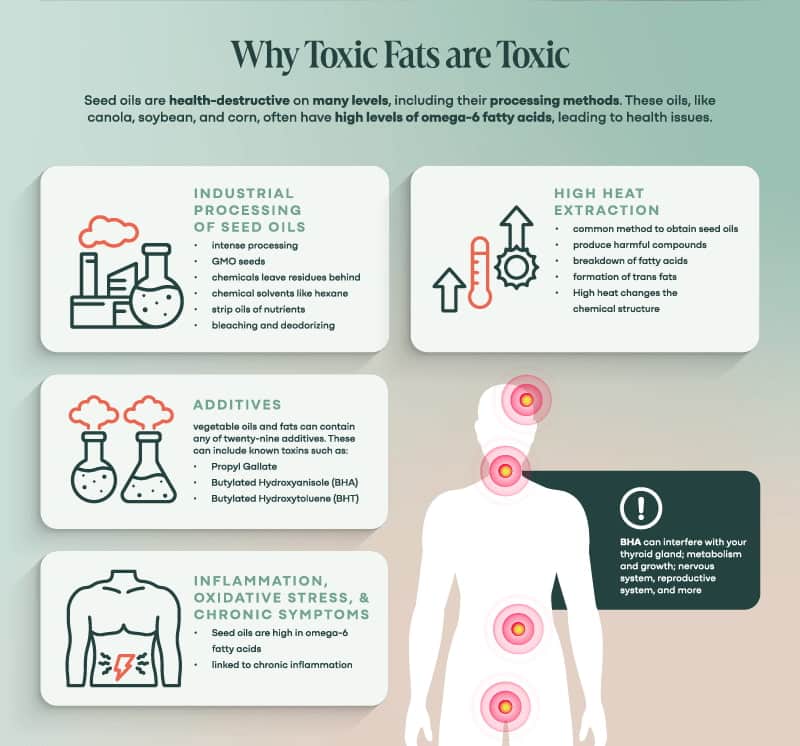
Swap seed oils for grass-fed butter, ghee, tallow, coconut oil, or avocado oil, and enjoy the peace of mind that comes from knowing your food isn’t laced with inflammatory additives.
Plus, nothing beats the taste of a home-cooked meal made with real, nourishing ingredients.
Ask Questions When Eating Out
Eating out can feel like a minefield when you’re trying to avoid toxic seed oils, but asking the right questions can make all the difference.
Don’t be afraid to ask what oil they cook with—many restaurants default to canola or soybean oil, but some will accommodate requests for butter, olive oil, or even tallow.
When ordering foods with sauces, dressings, or marinades, request them on the side or skip them entirely.
It might feel awkward at first, but remember—you’re the one eating it, and you deserve to know what’s on your plate.
Detox from Seed Oils
Detoxing from seed oils isn’t an overnight fix—since polyunsaturated fats (PUFAs) get stored in your cell membranes for years, it takes time for your body to clear them out.
But the good news?
You can actively support the process by eating an anti-inflammatory, nutrient-dense diet that helps your body repair and regenerate.

Start by eliminating seed oils entirely and replacing them with stable, nourishing fats like grass-fed butter, ghee, coconut oil, and tallow.
Load up on antioxidant-rich foods to combat oxidative stress and support cellular repair.
Gentle detox practices like infrared sauna therapy, dry brushing, and proper hydration can also help your body flush out stored toxins.
Most importantly, be patient—your body is always working to heal, and every step you take away from toxic oils and toward real, whole foods will make a lasting difference.
Putting it All Together
It’s easy to feel overwhelmed when you realize that seed oils are everywhere—restaurants, packaged foods, even so-called “health” products.
The good news is that you don’t have to be a victim of this scam.
Detoxing from seed oils doesn’t happen overnight, but it does happen.
Your cells regenerate.
Your metabolism recalibrates.
Your gut heals.
Start by ditching the fake fats, embracing traditional oils, and eating real, whole foods.
Support your body’s repair process with antioxidants, hydration, and time.
And most importantly, trust your body’s ability to heal when given the right fuel.
By swapping toxic seed oils for stable, nourishing fats, you’re making a powerful choice to take back your health—one meal at a time.
This isn’t about perfection—it’s about awareness.
Every step you take away from inflammatory oils and toward real nourishment is a step toward better energy, clearer thinking, and a body that works for you instead of against you.
The food industry won’t change overnight, but you?
You can start right now.
Learn more in our Rapid Gut Reset!
And thank your grandma. She was right all along about butter.
Ready to take back your health?
Unlock the tools, guidance, and support to reduce inflammation, restore balance, and finally feel good in your body again.
Join Rapid Gut Reset NowFAQs
-
How do I know if a product contains seed oils?
Check the ingredients list for canola, soybean, corn, cottonseed, sunflower, safflower, grapeseed, or rice bran oil. If it says “vegetable oil” or “oil blend,” it’s usually a red flag for seed oils.
-
How long does it take to detox from seed oils?
Because polyunsaturated fats (PUFAs) get stored in your cells, it can take several years to fully clear them. However, you can support the process by eliminating seed oils, eating an antioxidant-rich diet, and using detox methods like sauna therapy.
-
What are the best oils to use for cooking?
The best stable, non-toxic fats for cooking include grass-fed butter, ghee, tallow, coconut oil, and avocado oil(avoid cheap, refined versions). These fats are heat-stable and support overall health.
-
What’s the fastest way to reduce seed oils in my diet?
Start by eliminating processed foods—most packaged snacks, condiments, and restaurant meals are loaded with seed oils. Cook at home using stable fats like butter, ghee, coconut oil, and tallow. When eating out, ask about cooking oils and request alternatives like butter or olive oil when possible.
-
How do I tell if avocado oil contains seed oils?
Look for cold-pressed, extra virgin options in dark glass bottles from reputable brands. High-quality oils will have a rich color and a distinct aroma. If the oil is cheap, overly clear, or labeled as “pure” or “light,” it’s likely refined or adulterated with seed oils.
-
If seed oils are so bad and have few health benefits, why do doctors and health organizations recommend them?
Decades of flawed research, industry-funded studies, and lobbying efforts have led to widespread misinformation about fats. Many health organizations still rely on outdated data linking saturated fat to heart disease while ignoring the extensive research showing the dangers of industrial seed oils.
-
Can I reverse the damage caused by seed oils?
Yes! Your body is incredibly resilient. By eliminating seed oils, prioritizing anti-inflammatory foods, and consuming healthy fats, you can help repair your cell membranes and support your metabolism. Adding antioxidant-rich foods, staying hydrated, and using detox methods like sauna therapy can further speed up the process.
-
Great news! Avocado oil isn’t a seed oil!
Although avocado oil comes from the flesh of the avocado it is still sometimes misclassified as a seed oil. High-quality avocado oil is a healthy option, due to the antioxidants in avocado oil as well as the fatty acids in avocados. Including avocado oil in your diet is a great way to enhance your health and reduce the risks of high-heat cooking.

